Apothecary Meaning in the Bible: Spiritual Symbolism
In the Bible, an apothecary was a highly skilled individual responsible for crafting sacred anointing oils and incense integral to Israelite worship. The term, rooted in Hebrew ‘raqach,’ appears in passages like Exodus 30:25 where meticulous preparation of holy anointing oil signifies spiritual dedication.
Ecclesiastes 10:1 likens an apothecary’s ointment to wisdom, implying a deep connection between physical creation and divine purity. These practices underscored the sanctity of rituals, blending medicinal knowledge with theological significance.
Discover more about how ancient apothecaries combined faith and meticulous craftsmanship in their spiritually enriched roles.
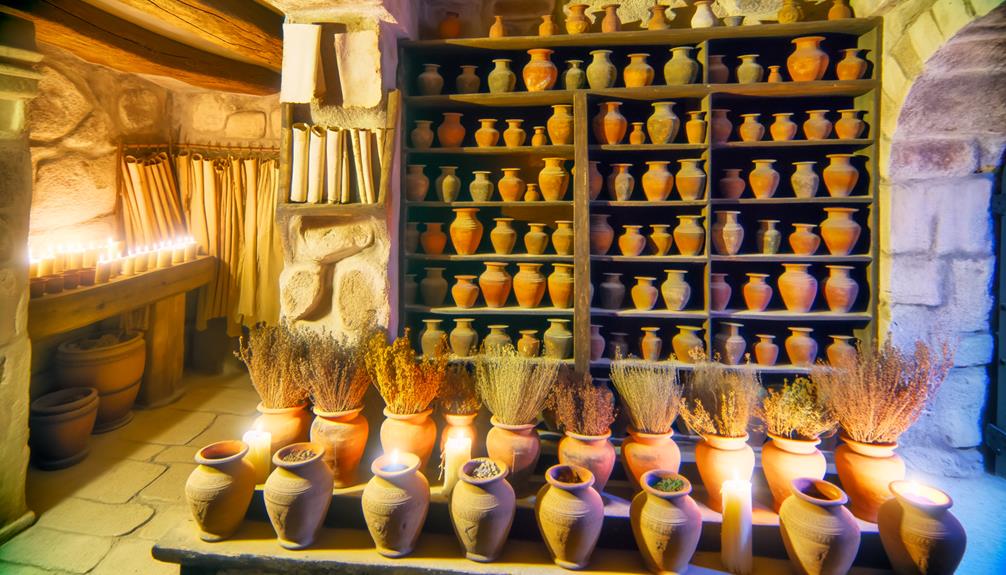
Comprehensive Understanding of Apothecary in the Bible: Symbolism and Importance
| Aspect | Details |
|---|---|
| Meaning of Apothecary | In biblical terms, an apothecary refers to a skilled individual who prepared and blended oils, ointments, and medicines, often for sacred or medicinal purposes. |
| Biblical References | Key scriptures like Exodus 30:25-35 detail apothecaries’ work in creating holy anointing oils used for consecration and worship. |
| Symbolic Role | The apothecary symbolizes healing, divine craftsmanship, and spiritual purity, emphasizing the importance of sanctity and preparation in worship. |
| Practical Role | They were tasked with producing mixtures for medicinal and sacred use, ensuring purity and adherence to divine instructions. |
| Importance in Worship | Apothecaries played a vital role in Old Testament worship by preparing sacred oils for anointing priests, kings, and sacred objects, marking them as holy. |
| Modern Relevance | The concept reflects the ongoing significance of healing, care, and dedication in spiritual and religious practices today. |
Biblical References
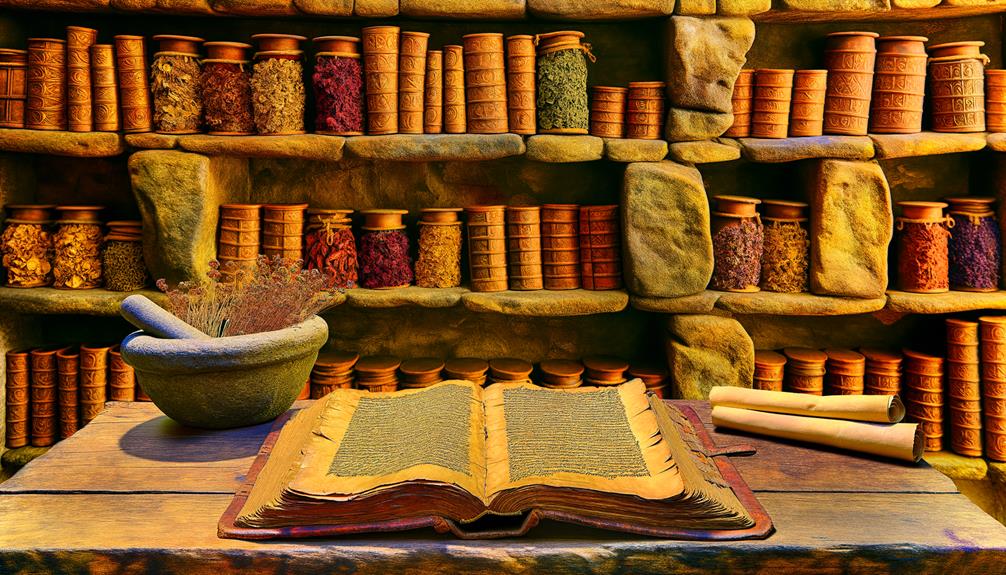
In the Bible, the term ‘apothecary‘ is primarily referenced in the Old Covenant, where it denotes individuals skilled in the preparation of anointing oils and sacred perfumes.
Specifically, Exodus 30:25 mentions the formulation of holy anointing oil by ‘a perfumer’ or ‘apothecary,’ highlighting their essential role in religious rites. These artisans followed divine instructions, underscoring the sacredness attributed to their craft.
The Hebrew term ‘raqach’ reflects their expertise and meticulousness. In Ecclesiastes 10:1, the apothecary’s ointment symbolizes wisdom and reputation, illustrating deeper theological insights.
Through scriptural references, the apothecary’s work transcends mere craftsmanship, embodying a spiritual significance interwoven with the covenantal relationship between God and His people.
Role in Ancient Practices
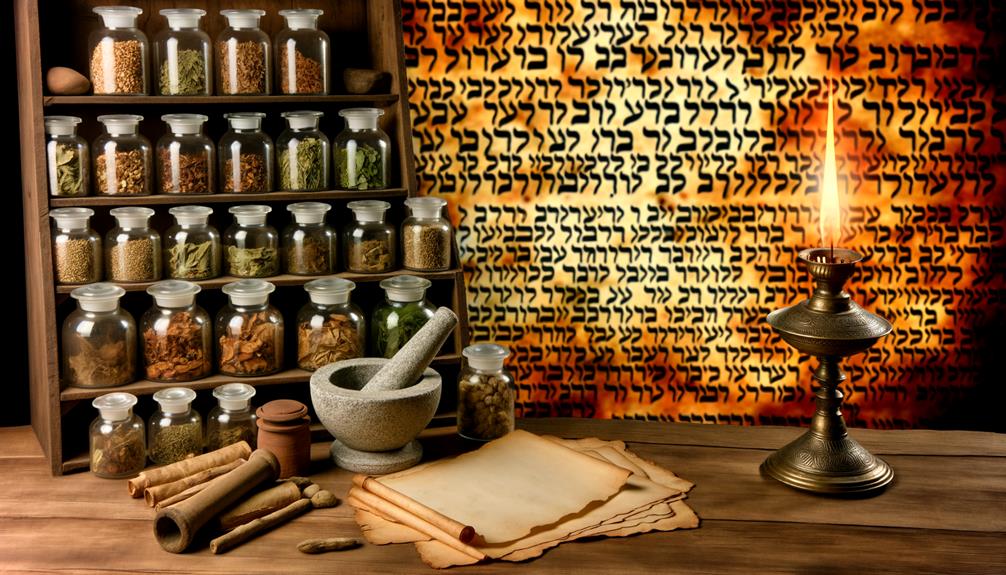
The role of the apothecary in ancient practices was pivotal, encompassing the preparation of medicinal herbs and the execution of healing rituals imbued with theological significance.
Scriptural references, such as Exodus 30:34-38, illustrate the meticulous process of crafting anointing oils and incense, integral to both physical healing and spiritual sanctification.
These practices underscore the intersection of health and holiness, revealing a profound understanding of the apothecary’s contributions to communal well-being in biblical times.
The careful preparation of herbal remedies and anointing oils not only served practical purposes but also signified divine care and providence, suggesting that when the body is tended to with sacred intentions, all is well in the Bible.
This harmonious blend of spirituality and medicinal practice emphasizes the holistic view of health in ancient cultures, where physical ailments and spiritual afflictions were often seen as interconnected.
Medicinal Herb Preparation
Ancient apothecaries played an essential role in the preparation of medicinal herbs, blending their extensive knowledge of botany with scriptural directives to create remedies that were both practical and spiritually significant.
References to medicinal herbs in the Bible, such as myrrh, frankincense, and hyssop, underscore their dual purpose in physical healing and religious practices.
The meticulous process of selecting, drying, and combining these herbs was guided by a profound understanding of their properties, as well as scriptural teachings that imbued their use with spiritual meaning.
For instance, Exodus 30:23-25 details the preparation of anointing oil, highlighting the precise mixture of herbs and spices as decreed by divine instruction, reflecting the integration of faith and medicine in ancient practices.
Healing Rituals Significance
Healing rituals in biblical times were deeply interwoven with theological beliefs and scriptural mandates, reflecting a holistic approach to health that encompassed both physical and spiritual dimensions.
These rituals often involved anointing with oils, prayer, and the use of specific herbs, signifying divine intervention in the healing process. The apothecary’s role was vital, preparing medicinal compounds that were believed to be imbued with sacred significance.
| Ritual | Scriptural Reference |
|---|---|
| Anointing with oil | James 5:14 |
| Prayer for healing | Matthew 8:16 |
| Use of herbs | Ezekiel 47:12 |
| Laying on of hands | Mark 16:18 |
These practices underscore a profound belief in God’s sovereignty over health and illness, intertwining faith with healing.
Holy Anointing Oils
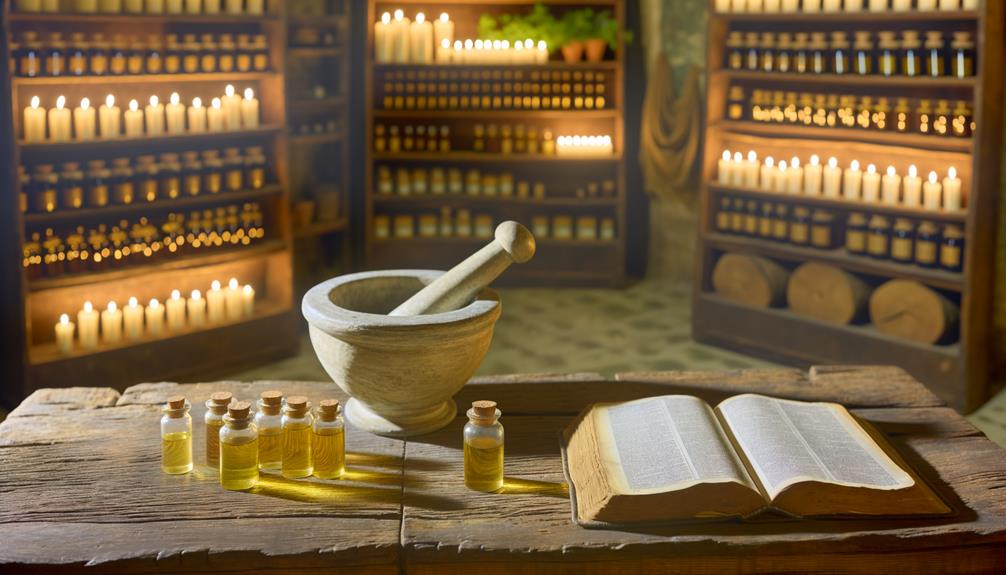
How did holy anointing oils, meticulously described in the Old Scriptures, serve both sacred and ceremonial purposes for the Israelites?
Biblically, anointing oils were divine instruments ordained by God, crafted with specific ingredients as outlined in Exodus 30:22-25. The sacred blend included myrrh, cinnamon, calamus, cassia, and olive oil, symbolizing purity and consecration.
These oils were used to anoint the Tabernacle, its furnishings, and the priests, setting them apart for holy service (Exodus 30:26-30). Theologically, anointing signified God’s presence, blessing, and empowerment, underscoring the sanctity of worship and leadership.
Scripturally, the practice exemplified obedience to divine commandments, reflecting the Israelites’ covenant relationship with God. Consequently, holy anointing oils were integral to Israelite religious life and worship.
Sacred Incense Crafting
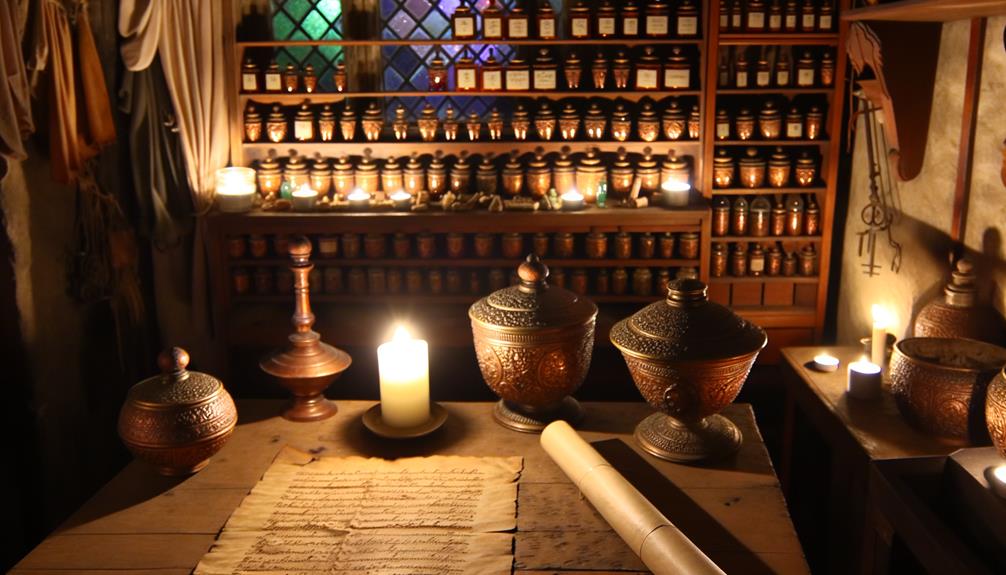
Just as holy anointing oils played a pivotal role in Israelite worship, the crafting of sacred incense, as delineated in Exodus 30:34-38, was equally essential in creating a fragrant offering pleasing to God.
This sacred mixture, composed of stacte, onycha, galbanum, and pure frankincense, was meticulously prepared by skilled apothecaries. The specific instructions underscore the importance of adhering to divine prescriptions, reflecting the theological principle of holiness and separation.
The sacred incense was not merely a sensory element but a profound act of devotion, symbolizing prayers ascending to heaven. The exclusivity of its use, restricted solely for worship, further emphasized its sanctity and the reverence due to God’s presence in the tabernacle.
Symbolism and Significance

In examining the symbolism and significance of the apothecary’s craft within biblical worship, it becomes evident that the meticulous preparation and use of sacred substances were deeply intertwined with the theological concepts of sanctity and divine presence.
The anointing oils and incense, crafted according to divine specifications (Exodus 30:22-38), represented purity, holiness, and the consecration of space and individuals to God’s service.
These substances were not merely aromatic but symbolized the prayers of the faithful ascending to heaven (Psalm 141:2).
The apothecary’s role, consequently, was not just functional but profoundly spiritual, embedding physical acts with profound theological meanings, reflecting the intimate connection between material creation and divine worship in the biblical tradition.
Modern Interpretations

Modern interpretations of the apothecary’s role in biblical narratives often explore the evolving understanding of sacred practices and their relevance in contemporary spiritual contexts. Scholars and theologians highlight how the ancient craft of preparing sacred anointing oils and incense can be understood today through:
- Historical Context: Recognizing the apothecary’s role in the meticulous preparation of sacred substances, as outlined in Exodus, underscores the importance of ritual purity.
- Theological Insight: These practices symbolize divine presence and holiness, inviting reflection on how modern worship can incorporate such elements.
- Scriptural Analysis: Examining passages like Exodus 30:22-33 reveals deeper layers of spiritual meaning, demonstrating how God’s instructions for the apothecary were integral to Israelite worship.
These perspectives provide a richer appreciation of ancient and modern faith practices.
Conclusion
The role of the apothecary in biblical times was multifaceted, encompassing the preparation of holy anointing oils and sacred incense.
One fascinating statistic is that the specific ingredients for the anointing oil mentioned in Exodus 30:23-25 weigh approximately 12.5 pounds, reflecting the meticulous care involved.
This underscores the theological and symbolic significance of the apothecary’s work, which was integral to ancient religious practices and continues to hold interpretive value in modern theological studies.






